Maybe Dolly Is the Goal, but Loretta Is the Truth
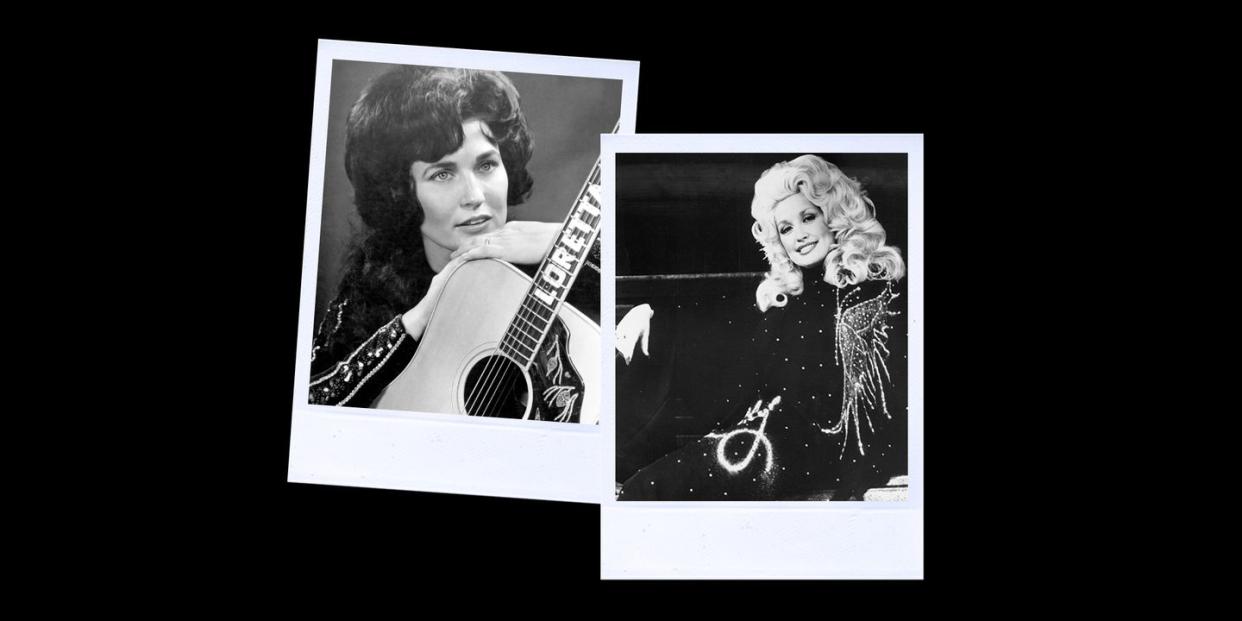
- Oops!Something went wrong.Please try again later.
- Oops!Something went wrong.Please try again later.
https://www.themountaineagle.c...Loretta Lynn was a 27-year-old mother of four the first time she went onstage. It was her late husband’s idea. In a 1998 television interview with Roseanne Barr, she candidly described the earliest days of her career, when her husband, Oliver V. Lynn Jr., who also went by Mooney, Doolittle, and Doo, brought home a $17 guitar and told her to learn to play it. She also explained the reason why—despite the migraines she got every time—she felt compelled to perform.
“Let’s put it like this,” she said, “I had four kids, and if one of ’em made a mistake—the little boogers would get into things during the day and I couldn’t whip ’em, I couldn’t whip them to save my life—I’d say, ‘Soon as your daddy comes home, he’ll kill ya, I’m gonna tell him,’ and it didn’t take but a couple times that I quit that, because when he’d come home, he’d whip them, and he’d give me one, too.”
Barr seemed enamored by Lynn’s frankness, mystified by the notion that a young Loretta Webb might not have wanted to become country star Loretta Lynn. “So you went onstage to sing,” she said, “because you thought he was gonna kick your butt if you didn’t?” Probing further, she asked, “You didn’t ever like it?”
“Well, no,” Lynn answered, “because I hadn’t ever done it. You gotta realize, where I come from, Roseanne, was way back in the mountains.” She went on to explain that when she and Doo moved to a logging town in Washington State, she rarely left the house. “One time I went to the grocery store and was scared to death to go in,” she said. “He’d usually pick up a few groceries on the way home from work.”
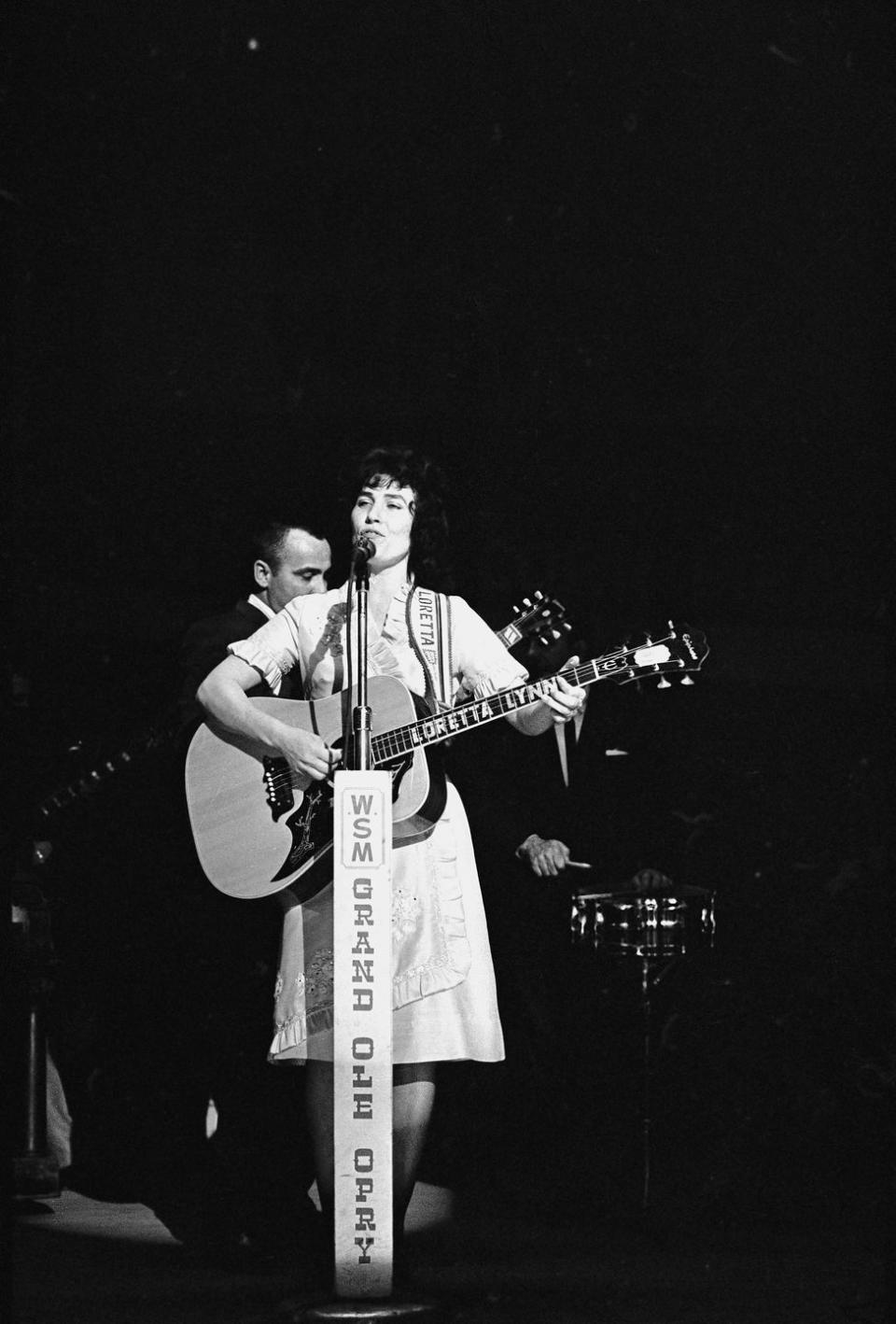
“Whoa, I can’t even deal with that,” Barr said, mouth agape. “It’s so amazing.”
Re-watching the interview now, I’m left wondering which part Roseanne found amazing. Was it that Lynn’s rags-to-riches story hadn’t necessarily been a happy one? That her husband had whipped her like a child? That the reason she gave for how uncomfortable she felt around strangers—onstage, in the grocery store—was the place she came from?
“It’s true,” Lynn said, and something like a shadow passed behind her eyes, a private, exiled sadness I recognized right away, the realization that one’s experience could seem otherworldly, farfetched even. Rural Appalachian culture is, by geographical definition, distinct and relatively impenetrable from within and without, even if you’re Loretta Lynn. She couldn’t return to the mountains and the self she was before she left, but she didn’t belong anywhere else. Even several decades later, even as the designated Queen of Country, she was still visibly affected while describing those first isolating experiences of traveling, of becoming, beyond the boundaries of home.
I left the mountains of Eastern Kentucky as a young adult, one casualty of many migrations out of Appalachia that have been happening since the coal industry began its slow decline in the 1940s, and I’m not exaggerating when I say this is one of the great heartbreaks of my life. Like Lynn, I don’t live where I belong, where my people have lived for centuries; I am the end of that tradition. As I watched the rest of the interview, I kept returning to the lyrics of an old country song my Grandma Betty would call upon to prod me toward a better attitude, to save me from being swallowed up in self-pity, and steer me toward the light. “It’s your baby, you rock it,” she’d say, which felt less like an exhortation than a nod to the burden every rural-born woman carries, and the perceived inevitability of that burden.
I’ve never met Loretta Lynn, but one of her third-great grandfathers, Richard Abednego “Meb” Baker, is my fourth-great, on my mom’s side, which means that not only am I related to her, but also to her younger sister, Crystal Gayle, and cousin, Patty Loveless. Mother Maybelle Carter, née Addington (my mother’s maiden name), is another cousin of mine, as is her daughter June Carter Cash. By marriage, I’m even related to Roseanne Cash, June’s stepdaughter.
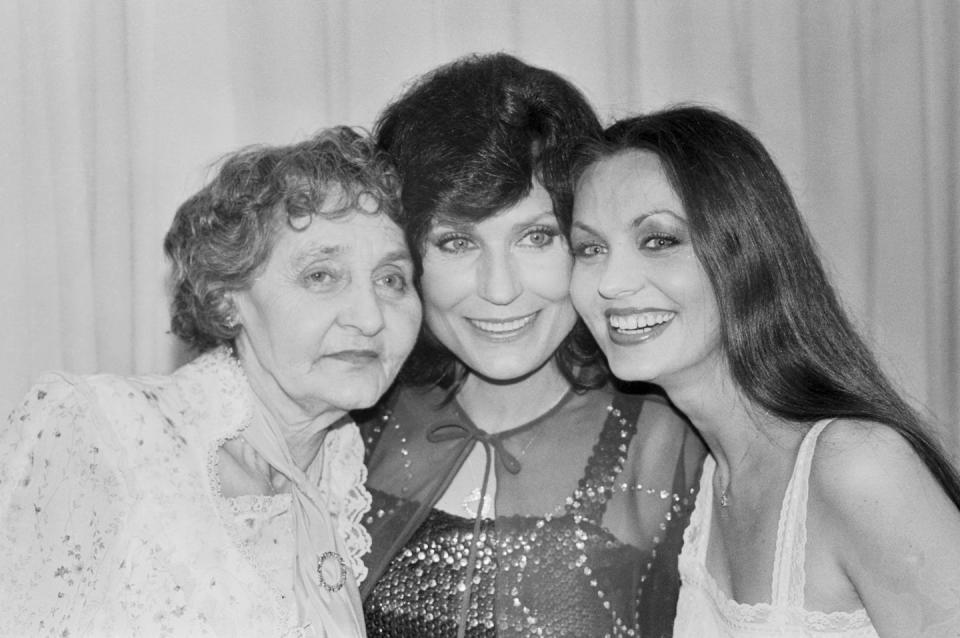
All of this is far less impressive than it sounds, because each of us—Maybelle, Loretta, my mother, me—were born along the Kentucky-Virginia border in what are now shuttered coal towns: tiny, sylvan villages in which descendants of the same families have lived and worked for hundreds of years. Many of those families, including three of my grandparents’, predate the coal industry, the Civil War, even the American Revolution. I have ancestors who fought for the Confederacy and the Union, two who enlisted with the South but finished the war fighting for the North. Some of my people were Quakers, some were founders of the Old Regular Baptist faith, and at least three were murderers, including my paternal great-great-grandfather, Lyon Steven Kenningham “Ham” Benge, who served time in the Kentucky State Prison around the turn of the last century for killing a man over politics, though I have no idea what his politics were. After his release, he worked as a farm hand for a while in Indiana, where I now live, where many Appalachian migrants do, and he died at the Montgomery County Poor Farm.
I was raised, for the most part, in Seco, named for the South East Coal Company, current population: 92*, but Letcher County (the name of which never fails to garner a chuckle from anyone who didn’t grow up there) is crowded with little communities like it, distinctive, traditional, and not necessarily sociable, where people might be friendly, or they might forego speaking to you if they don’t know your family, so deeply ingrained is the mistrust of outsiders and sense of belonging to a specific patch of earth.
Whitesburg, where I went to middle and high school, is the nearest town large enough to have a Main Street and a Walmart, and it has a population of 1,875. Over 98 percent of Letcher County is white, nearly 80 percent voted Republican in the last presidential election, and nearly 30 percent lives below the poverty line. In nearby Clay County, where my father’s family is from, where Lyon lived, the poverty rate is close to 33 percent. Most of the region has been classified a “desert” of food, books, and the internet, and many counties boast murder rates as high or higher than those in major U.S. cities. Loretta Lynn is from Van Lear, in Johnson County, two counties over from Letcher, with virtually identical demographics, where a Democrat hasn’t won the majority of the vote in a presidential election since 1880.

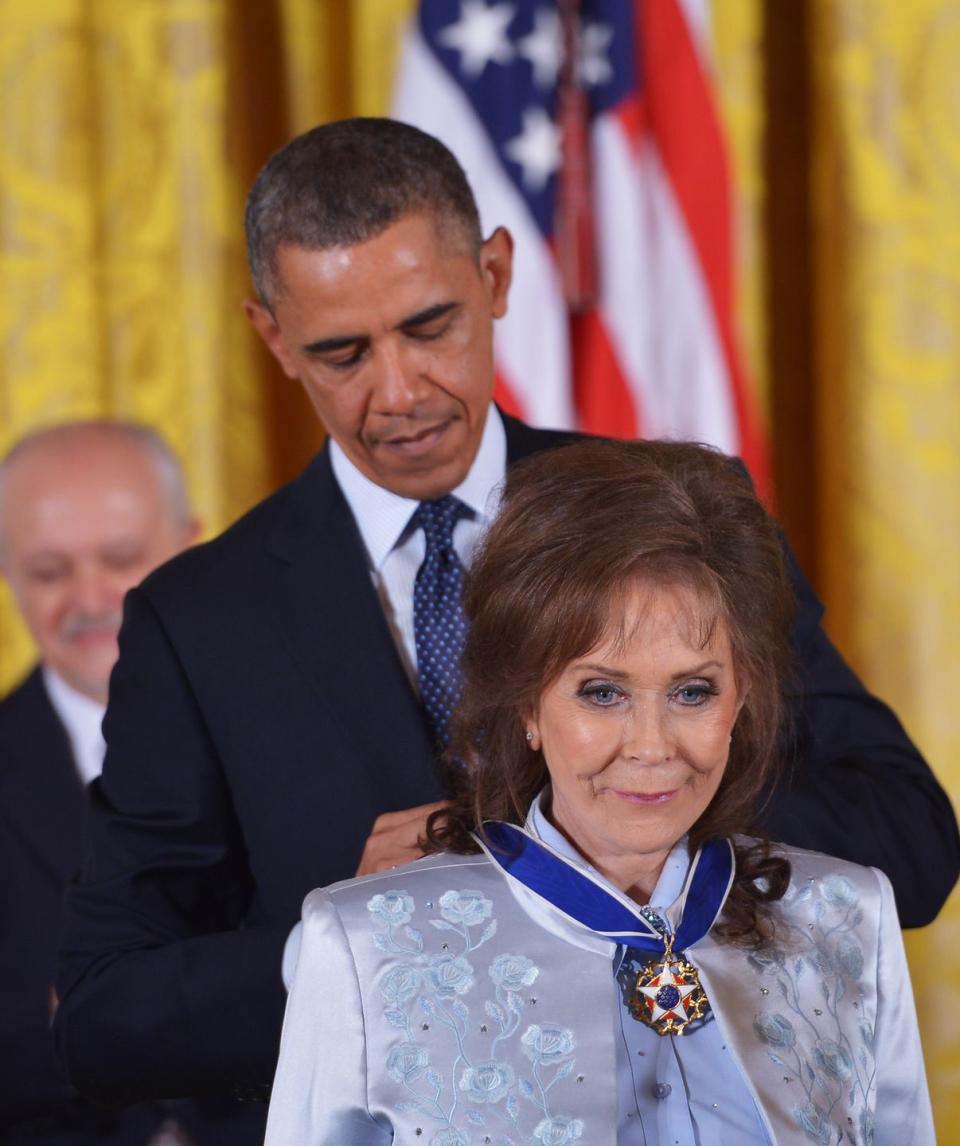
Politically though, like many Eastern Kentuckians, Lynn is a paradox. She insists that her music “has no politics,” but at least three of her songs were so radical they were banned from radio, including “The Pill,” which celebrated the reproductive freedom that didn't become widely available until after four of her six children were born. Of the five or six presidents she performed for, Jimmy Carter was her favorite, and they became friends, but she donated to Republican candidates during the same period. She play-married Trump enthusiast Kid Rock on Instagram last year, but has also collaborated with Trump denouncer Jack White. “I’m not a big fan of women’s liberation,” she has said, “but maybe it will help women stand up for the respect they’re due.” Early in his presidency, Lynn expressed support for Donald Trump and criticized the Women’s March in D.C., which I attended, for not being classy enough, and when asked her opinions on same-sex marriage, responded with, “I’m still an old Bible girl. God said you need to be a woman and man, but everybody to their own.”
I have worried more than I care to admit that social media might get wind of Lynn’s right-leaning political ambivalence and “cancel” her, and by that I mean devalue her legacy, her contribution to American culture, even to American feminism, simply because some make peace with a complicated world through division and duality, through easy definitions of good and bad, rich and poor, light and dark. This worldview is a luxury many Appalachians simply don’t have and never had.
Outside my extended family, I’ve never been compared to Loretta Lynn, but I have been compared to Dolly Parton, America’s favorite Appalachian, whose open-hearted politics seem to confound no one. I was well past 15 when my board-flat chest erupted into breasts that spilled from the front and sides of the flimsy cotton training bras I wore. My family was religious even by Seco’s standards, even by Lynn’s, and I’d actually been praying for breasts in the hopes that boys at school would stop teasing me, hating me, it seemed sometimes, for the terrible disappointment of my body. Like most wishes made by adolescent girls, I regretted mine the moment it was granted. My new breasts were floppy, sweaty, and painful. More than a mouthful is too much, the boys now said, pity-patting me like doctors resigned to a fatal diagnosis. Such a waste, Dolly Parton. Pardon the expression, but in 1988 I would have given my right tit to avoid the daily persecution that back then we called “going to school.” East Kentucky Gen-Xers were, for the most part, a scrappy, striving generation of latchkey kids—resilient, resourceful, unknown and unknowable, even to ourselves, much like our counterparts in the rest of the country.
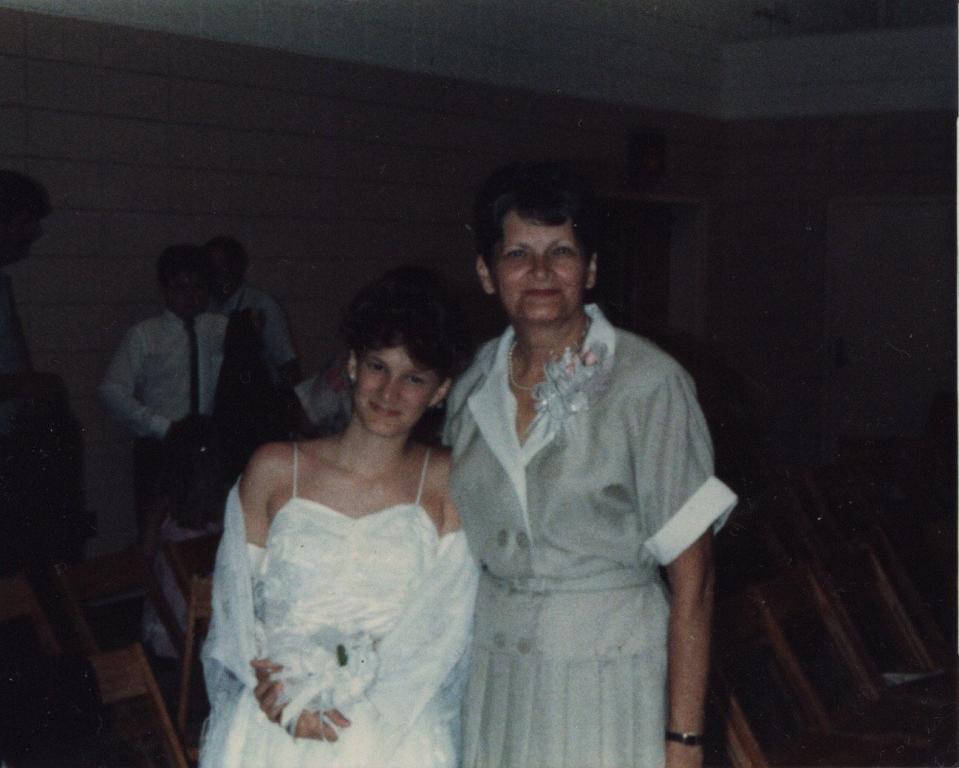
The difference, if there was one, is that we were living through an apocalypse of sorts, and one that was happening, and is still happening, in slow motion. “Coal Employment has fallen to only 17 in Letcher Co.” per a recent headline in the Mountain Eagle, the county’s main local newspaper, and we have been counting that number down for as long as I remember. Growing up, we all had grandfathers from Lynn’s generation and the one before who had lived and often died in the mines, but I only knew a handful of girls whose dads were coal miners, men who appeared like phantoms in the checkout aisle of the grocery store where I worked when they’d finished a shift, the whites of their eyes bright as headlamps in their soot-black faces. It’s hard to explain, but there was a kind of tragic romance to it all, and people still sometimes talk proudly about how much money could be made by any man willing to work underground, to risk life and limb to feed his family and feed them well.
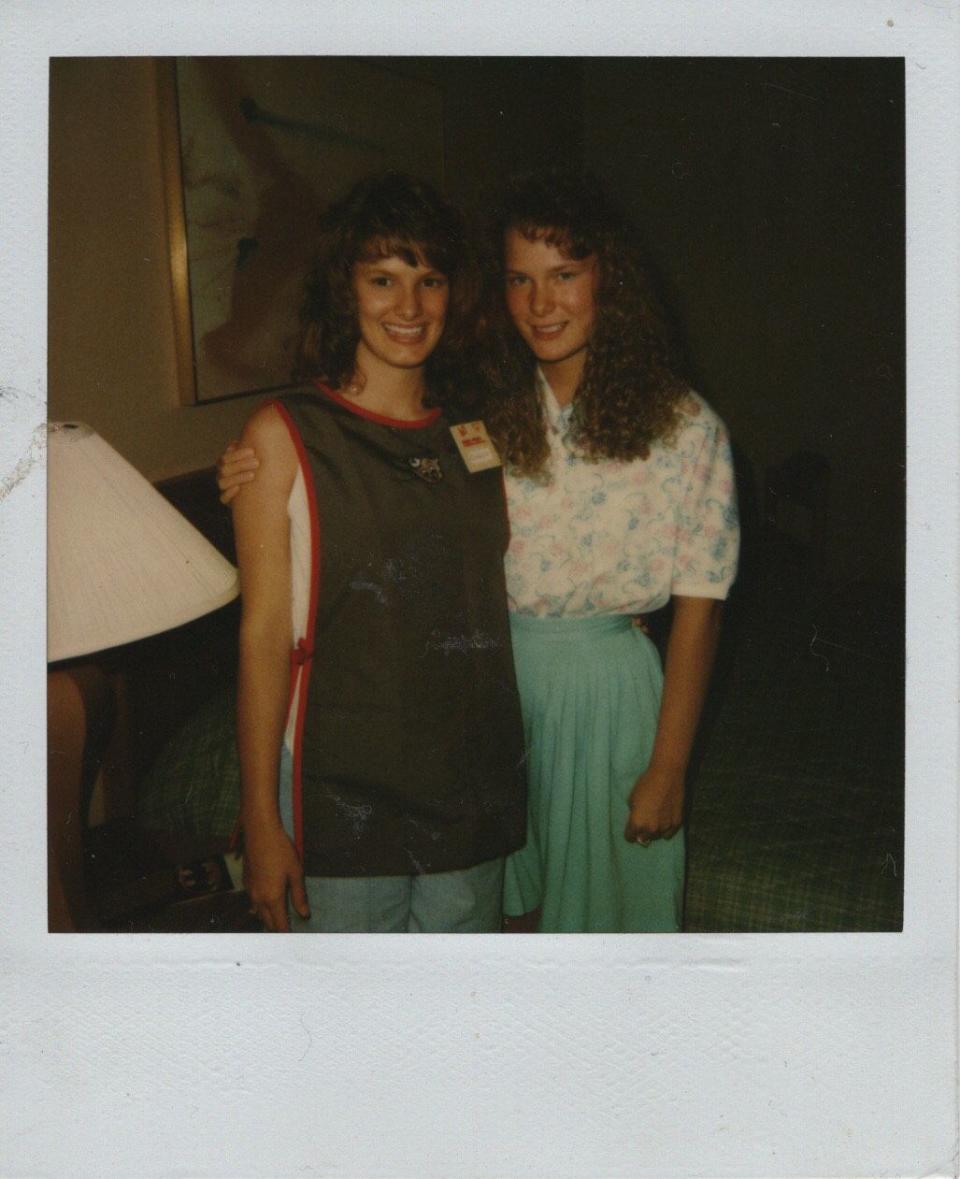
By then, most parents I knew, mine included, were preoccupied with the impossible task of piecing together a livable income from mere scraps of jobs, sifting through the economic rubble left behind by sated, half-in, half-out coal companies that, like a jealous spouse, had long since quit us but refused to make room for a replacement. Those companies dished out a slow kind of violence, too, and not just the physical kind of underregulated deep mines. There was also the surface-mine violence that decapitated the mountains around us, that stripped the skyline bare and drove potential tourists away. But worst, most insidious, was the soul-crushing violence of lack, of be-happy-with-what-you’re-given, of turn to God and the church because politicians will not help you, of spare the rod and spoil the child. We kids survived mainly on cold cereal, white bread, bologna, and snack cakes, on peer pressure and competition, movie rentals and, of course, television.
Even as a girl, thanks to television, I knew exactly what the rest of the country thought of me, some of which was true, some of which was not, and all of which hurt. To paraphrase the writer Chimamanda Ngozi Adichie, the problem with stereotypes is not that they’re false, but that they’re incomplete and begin, quite cruelly, in the middle of the story, which renders the actions of the people being stereotyped incomprehensible, absurd, even inhuman. I took every terrible joke personally. Every toothless grin; every dumb, horny hillbilly girl seemed to have been created with me in mind. “Godalmighty,” my mother used to say on those rare occasions that Eastern Kentuckians appeared on the nightly news. “How long did they look for that one?” She meant that when the rest of America did actually notice us, it saw what it wanted to see. After all, our country had already decided what we were—a gross failure of capitalism and boot-strap theology—and wouldn’t be convinced otherwise. Believe me when I say that every time a so-called progressive makes a joke at the expense of poor, rural people, a Republican somewhere gets his wings. No population anywhere can be defined by a single characteristic, but if there is one thing the people I grew up with have in common, it’s taking ourselves far too seriously, if only because no one else will.
But Parton, it would seem, has never cared what anybody thought of her. “Show business is a money-making joke,” she told Barbara Walters in 1977, after being asked if she knew that people were laughing at her. “Oh, I know they make fun of me. But actually, all these years, you know, the people have thought the joke’s on me, but it’s actually on the public.” From the first days of her career, when she was only 13 and performing at the Grand Ole Opry, she refused to internalize the shame I can only assume was heaped upon her from both inside and outside the place she came from. Besides her musical brilliance, this is her superpower as far as I am concerned, an anchored but flexible identity fortified by an undeterrable vision and impenetrable skin. I often wish more Appalachians, myself included, were like her—shameless, in the truest sense of the word.
Unfortunately, like Peter when the cock crowed, many of my peers and I made a practice of denying the culture we came from. We worshipped our grandparents but rejected any future lives that might bear a resemblance to theirs. Beyond hearsay and tall tales, we knew little of our respective family histories—that wouldn’t come until much later. We all wanted to be Cherokee royalty and we all wanted to come from old money in Scotland, Ireland, and England, because at least that would have been something. Most compliments we gave each other celebrated our un-Appalachianness, our noncomformity to the stereotypes that had been dictated to us from beyond the mountains. We strove to seem modern and urban, quick and valuable, to pass as city people, even to each other. We tried to speak and write like we were from somewhere, anywhere, else. I was, I thought, a weirdo who listened to bluegrass and old country, who quilted and sang my sister to sleep with old-timey hymns, but I didn’t share that part of myself with anyone but my immediate family, because I didn’t want to be teased for it, and because it seemed completely irrelevant and worthless in the world that mattered, which was, I believed then, the world beyond my own. Looking back, I imagine many of my friends did the same.
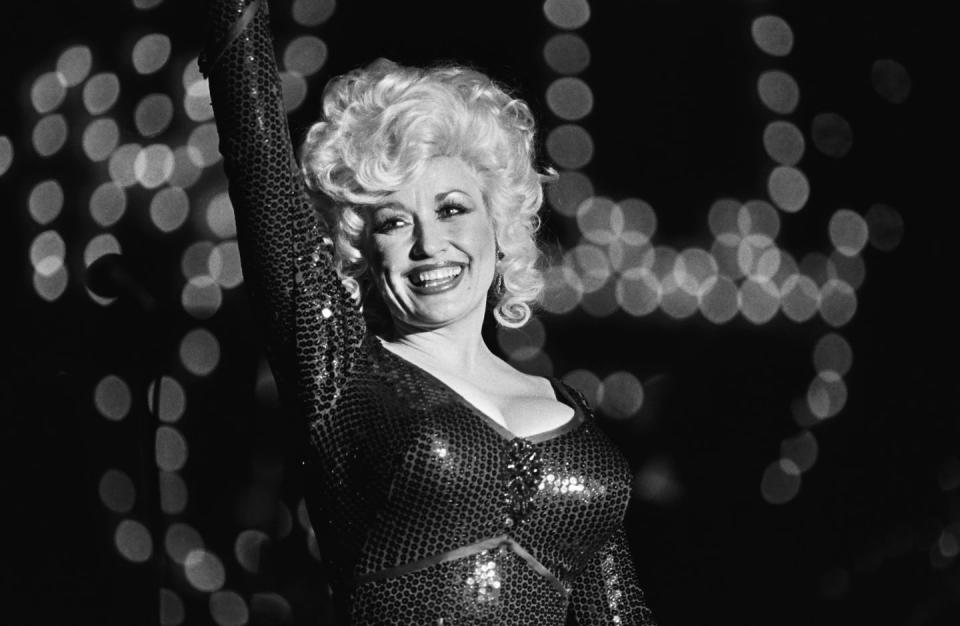
Dolly for president, Dolly deserves a Nobel, people now say of the singer-songwriter and humanitarian who helped fund Moderna’s COVID-19 vaccine research. But 30 years ago it was not a compliment to be compared to her. Some claimed she slept with Porter Wagoner to get to the top and Kenny Rogers to stay there, and often, instead of defending herself, she’d let those folks think what they wanted and joke about how men, sex, and food were her weaknesses, and not necessarily in that order. In countless interviews she’s revealed that she patterned her iconic look after the town prostitute, a proclamation that would have gotten me a whipping as a child. I wasn’t allowed to watch her portray a brothel madame in 1982’s The Best Little Whorehouse in Texas, and probably still would’ve been discouraged from seeing the film had I been an adult when it came out. In the ’80s, Parton seemed entirely, mystifyingly devoid of the shame and inner turmoil that often follow a childhood of poverty and punitive religion. She was, and I say this with all the love and admiration in the world, an aberration. I didn’t know a single woman who moved through life as freely, who had figured out how to celebrate the parts of her experience that were beautiful and discard the rest. Even her voice was lighter than air, not nasal and plaintive like Loretta’s, like mine.
Grandma Betty and I watched Parton’s variety show every Sunday as regularly as we attended church, but we spent a lot of that hour picking apart the false front of her wigs, acrylic nails, and allegedly augmented body. I realize now that we were only trying to understand her life, which seemed incomprehensibly modern to both of us, especially her childless, licentious marriage to Carl Dean, who seemed to have no interest at all in controlling or managing her. The sets and costumes of her show were often embellished with butterfly motifs, a perfect symbol of her transformation from the literal rags her mother sewed together to make her “Coat of Many Colors,” the inspiration behind her signature anthem, to riches, the amplified embodiment of the American Dream.
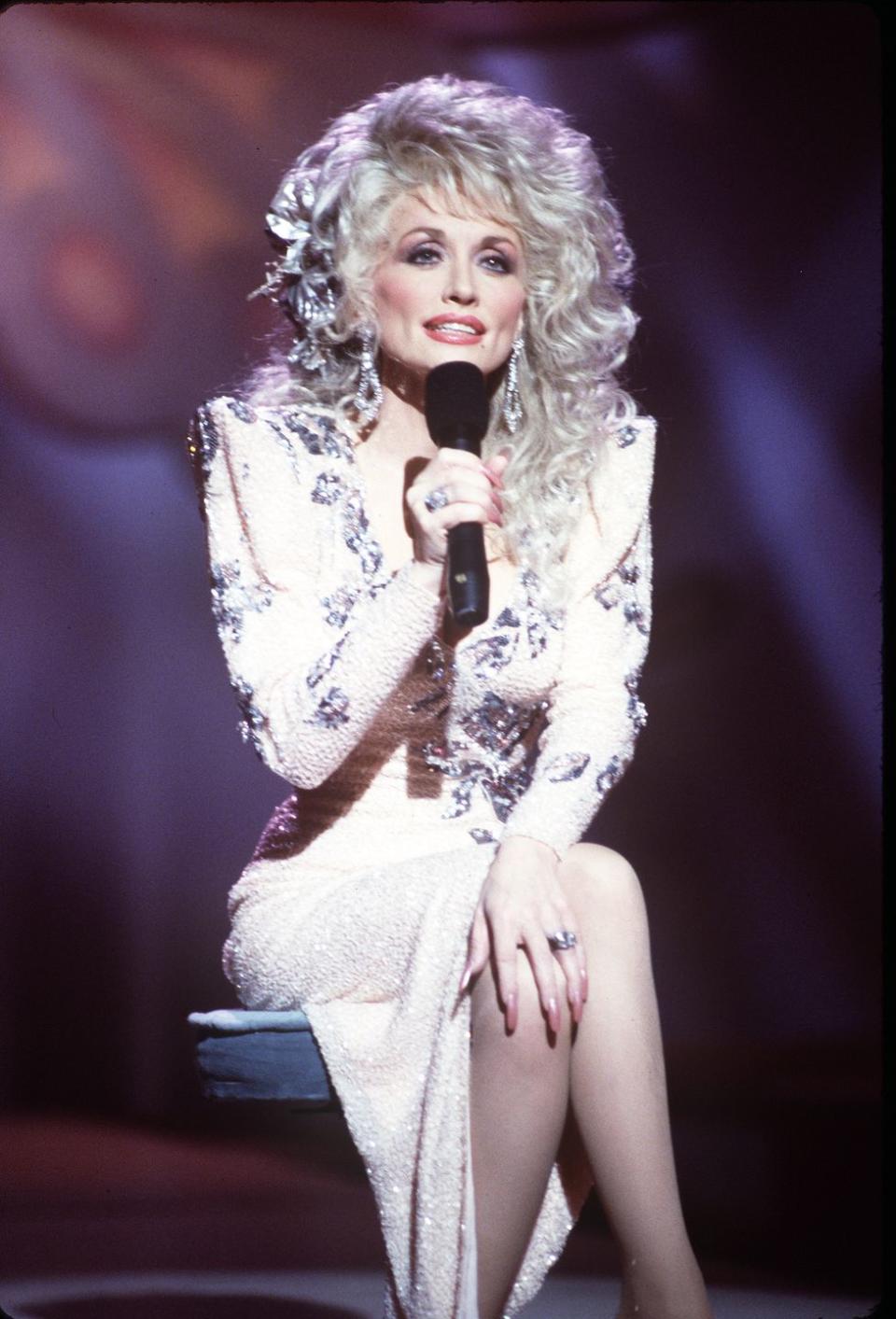
Parton’s was a dream I didn’t recognize, antithetical to my world and not solely because of money. From my current vantage point, I now know that my puberty was fairly ordinary, but it felt cartoonish at the time, and I hated the part of me that I associated with her, the apparent excess and easy access of my changing body. Lynn may have performed duets with Conway Twitty, but she did so in high-neck dresses with long sleeves, modest garments that were familiar to us churchy girls. And I never heard a single person question her loyalty to her husband, who was both her abuser and the only reason anybody ever got to hear her sing. He forced her to express herself, and she did, astonishingly, brazenly, and often at his expense via the very outlet he had afforded her. Through her music she asserted herself in ways she might have found impossible in her daily life as she straddled the impossible chasm of Appalachian familial duty and personal freedom. And she did all of this while remaining married for almost 50 years—up until her husband’s death in 1996, two years before her appearance on The Roseanne Show.
Lynn’s signature hit, “Coal Miner’s Daughter,” was released the same year as “Coat of Many Colors,” and while the two songs have many things in common (nostalgia, poverty, the Bible), the message of Parton’s, that poverty is a state of mind, that you can be rich without money, is quite different from Lynn’s, which makes no such claims, and simply reframes the shame of her family’s struggle as worthy of pride. Lynn’s father worked hard all day and was still poor. Her mother worked at home until her fingers bled. “Coal Miner’s Daughter” has no resolution or happy childhood lessons. Even Lynn’s East Kentucky accent, the same accent ridiculed so often on TV, is highlighted by her decision to rhyme the lines, “The work we done was hard/At night we’d sleep ’cause we were tired.” She finishes the verse with a statement that borders on ambivalence: “I never thought of ever leaving Butcher Holler.”
Is she glad she left? Does she want to go back? Surely she could now, if she wanted to, but in the final verse she returns to find there’s “not much left but the floor, nothing lives here anymore/except the memory of a coal miner’s daughter.” If the dream of Parton’s song is transformation through gratitude and sheer force of will, what is the dream of Lynn’s? I believe it’s nothing more than acknowledgement of the fullness of her experience, the good, the bad, and the ugly, and a desire to be seen and accepted as she is, in all her paradoxes and complexities.
My Grandma Betty and I would visit Lynn’s Johnson County whenever she’d collected enough S&H green stamp booklets to cash them in at the catalog store in Paintsville. Grandma never learned to drive, so I was her errand chauffeur. She’d usually treat me to lunch, a chicken liver dinner at Lee’s Famous Recipe, and maybe even a trinket—“play-pretties” she called them, like a lipstick or a lock-and-key diary—for my trouble.
Lynn still had family in the area, so it was always a possibility that she was close by. Her brother ran Webb’s Grocery, Van Lear’s company-turned-general store, virtually identical to the one in Seco, though ours had been closed for as long as I could remember. Grandma and I would often stop in at Webb’s for a snack, a time-capsule cabin, barely marked and indistinguishable from the homes that flanked it, familiar homes where people peered from their windows, wary and curious, when they heard a car outside.
On Butcher Hollow Road, my thoughts would always drift to the film version of Lynn’s life, Coal Miner’s Daughter, which premiered nearly a decade after her song of the same name. In an early scene, Lynn (played by Sissy Spacek) stays out too late, and her dad whips her hard with his belt. Afterward, her mom puts salve on the welts and warns her about men and love. The scene has always been my favorite, because I recognize the truth of it, the way her mother moves inchmeal, taking the greatest possible care to soften the trickle-down brutality of the mountains, the impossibility of their lives. And I can also see, even in that first scene, that Lynn’s leaving was inevitable.
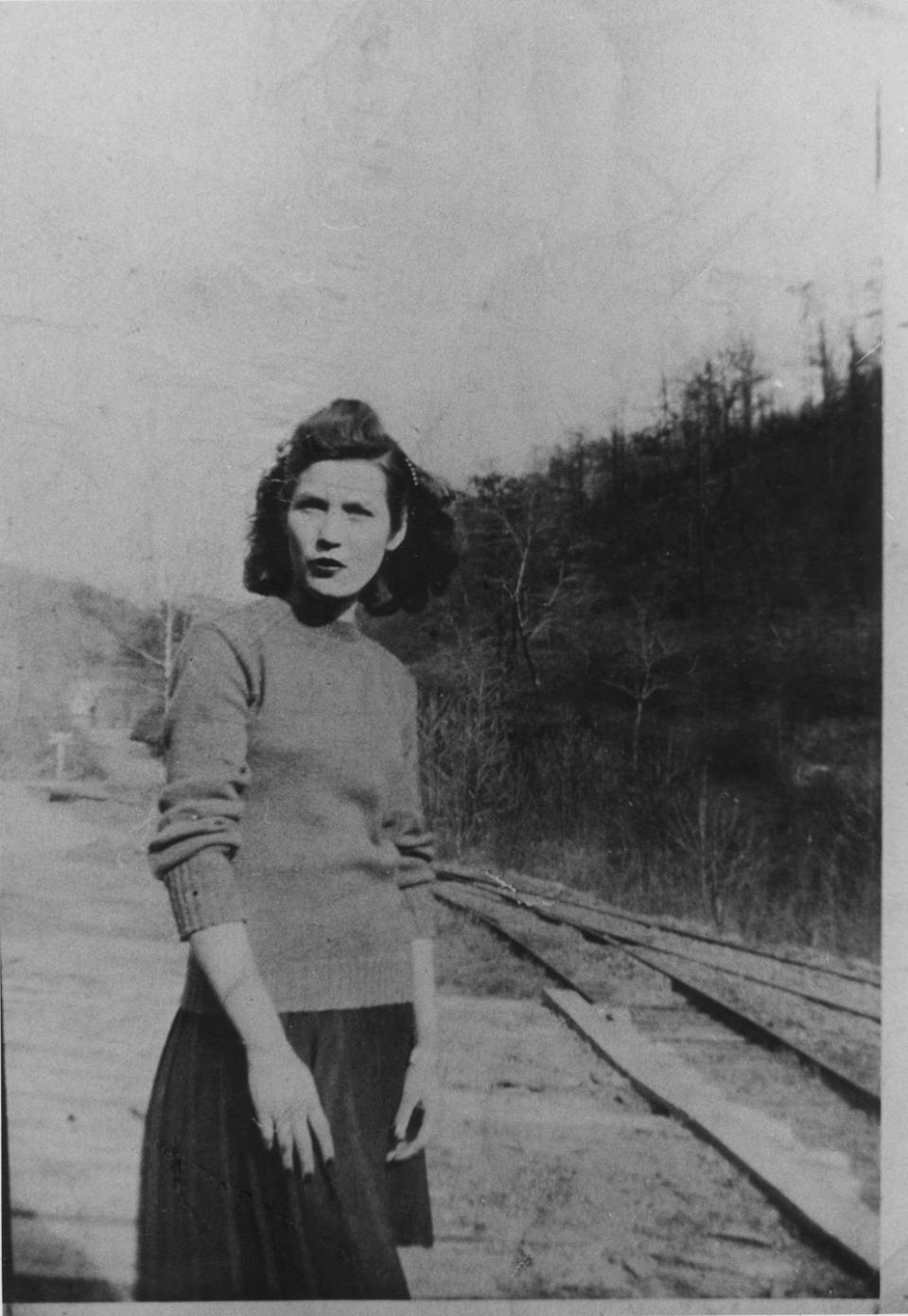
There was no parking lot off Butcher Holler Road, barely even a place to pull over, so I’d put the car in park, and we’d idle in the middle of the road while staring at Lynn’s family home until, always too soon, Grandma would say it was time to go home, time for me to find a place to turn around—no small feat in the mountains.
Admittedly, while writing this essay (and at certain points while writing my memoir, Kin), I had to fight the urge to indulge in what I’ve come to think of as Appalachian Apologetics, the tendency, in response to the aforementioned stereotypes, to defend the place and the people I come from, to amplify the good and minimize the struggle. I feel compelled to point out that the mayor of Vicco, a neighboring town with a population of 334, is an openly gay man, and that in 2013 Vicco became the smallest city in the United States to pass an ordinance outlawing discrimination for sexual orientation. I want to talk about racially diverse pockets of Appalachia, urban centers like Knoxville, Parton’s stomping ground, and to brag that the only Black man I knew growing up in Whitesburg became the city’s fire chief, and to my knowledge, first Black city official. In the midst of a book desert, Appalachians are opening small bookstores at great personal cost and financial risk. In the midst of a food desert, they’re digging for ginseng and hunting morels and wild turkey, they’re growing and donating their own fruit and vegetables or running CSAs. Eastern Kentucky is not progressive, but it is capable of progress, and I find it difficult not to brandish statistics, to place at the center of this essay revealing WaPo headlines like “Most Trump voters come from cities and suburbs” and “The 11 largest metropolitan areas in the U.S. gave Trump more total votes than all of rural America combined.” It seems impossibly unfair, given how little political power Appalachia has obviously ever had, to blame the region, and others like it, for the phenomenon of Trump.
The truth is that Appalachians don’t need to justify our existence to anyone, and taking a defensive posture means, tragically, errantly, accepting the middle of our story as the beginning. The more I learn about the place I come from, the more I understand that our story began long before Trump and the religious right, before we were abandoned by a neoliberal, bottom line-driven left, even before coal and poverty. Appalachian culture is not the absence of American culture; it is American culture, even when it is misunderstood, maligned, and disregarded, and even when it reveals, like a red-headed stepchild, the darker aspects of American history—exploitation, colonization, and greed. Whether the rest of America chooses to accept the people I love, they persist within the shelter of the mountains, and they are worthy of care and respect by simple virtue of their humanity. Nothing, not net worth or even politics, negates that humanity, our humanity.
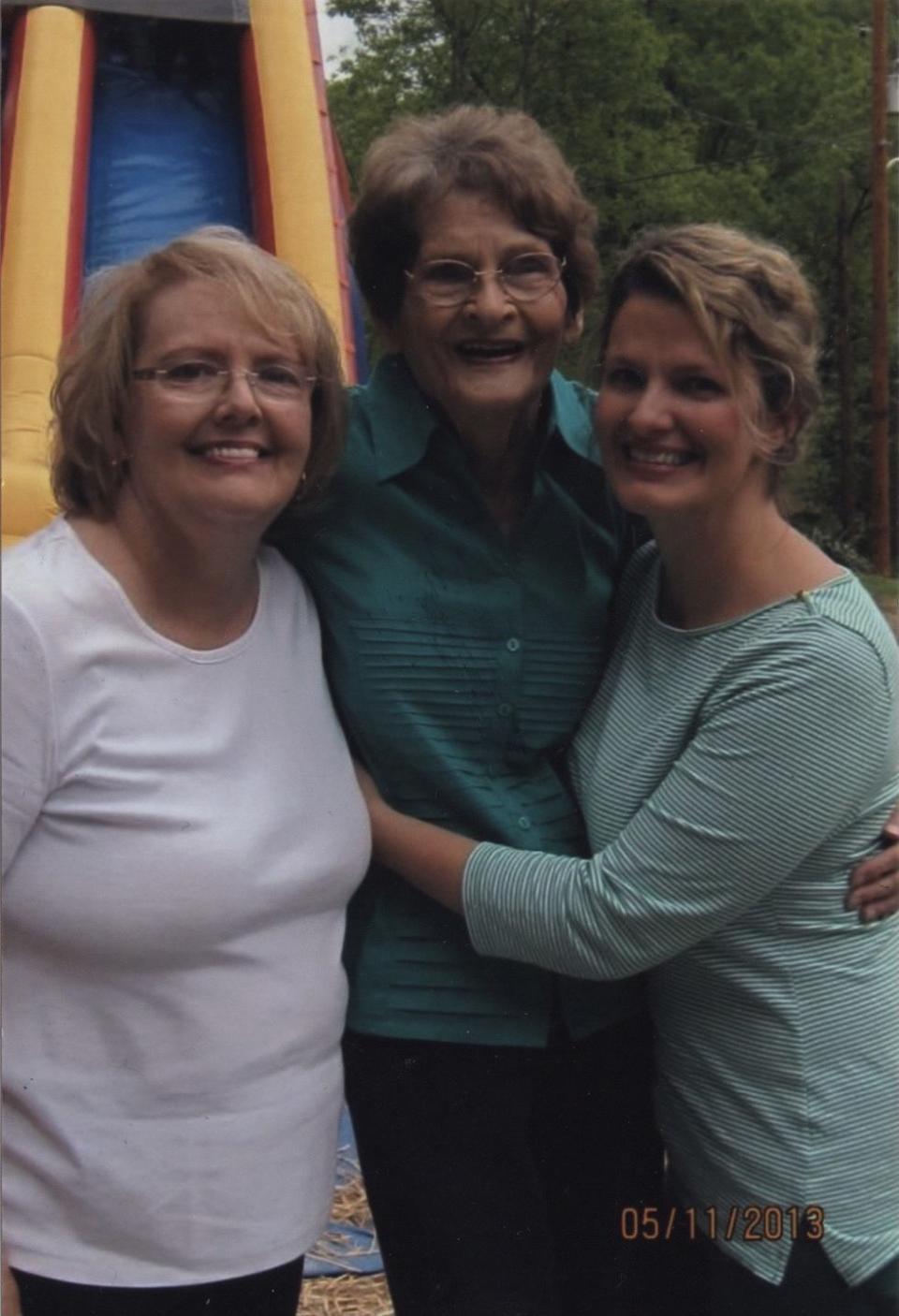
Years back, my mom had a panic attack on a South Carolina beach vacation. We were sightseeing in Hilton Head, which we’d heard about but never seen, and which was the pinnacle of urban fancy as far as we were concerned, bustling with expensive cars and well-dressed, important people. Like Lynn, like me, Mom often withered beneath the gaze of strangers, but her panic that day ran much deeper. After the unparalleled quiet of Seco, the noise was unbearable to her. As we browsed in high-end stores, she was visibly wounded by the price tags she saw and kept listing all the household necessities a woman could supply her family with for the price of one blouse. She was unnerved by the pace of the people around her, the race and competition of the traffic, the invisibility of pedestrians, the invisibility of the homeless. None of the women in the shops acknowledged each other, not even to talk about their children, and there wasn’t a single chair or bench to be found where she could rest and take in the scenery, where she could catch her breath. Clearly unimpressed as we hurried to the car, she wondered aloud whether people had decided against sitting as a general practice.
On the drive back to our modest beach rental in the boonies, she stared out the car window and focused on slowing her labored breath, the only sound in the car. I felt bad, because the trip was my idea, because, for reasons beyond me, I was the daughter always pushing her past her comfort zone, always talking up new experiences, larger ones, and as was often the case, it hadn’t gone well. Finally, after enough time had passed, Mom turned to me, her face hopelessly sad. “What is wrong with these people?” she asked, her voice little more than a whisper, “My God, not a sign of a tomato or corn plant anywhere! How do they stand living like this?”
*All demographic statistics are the most current estimates.
You Might Also Like

